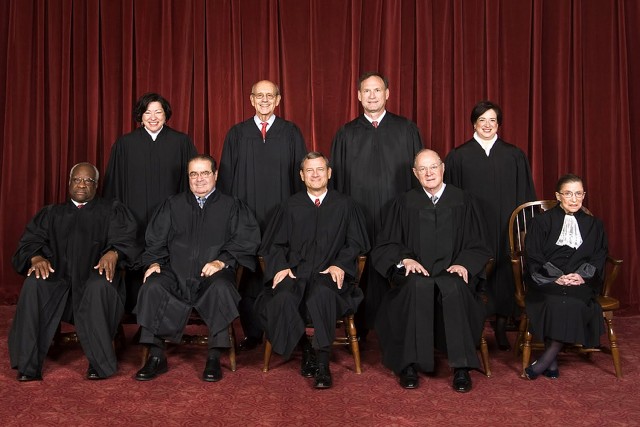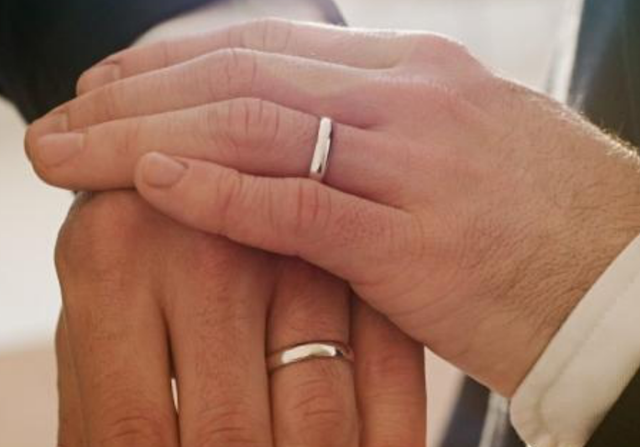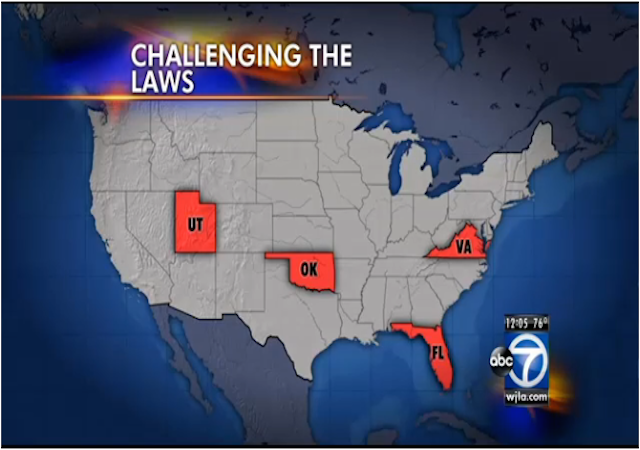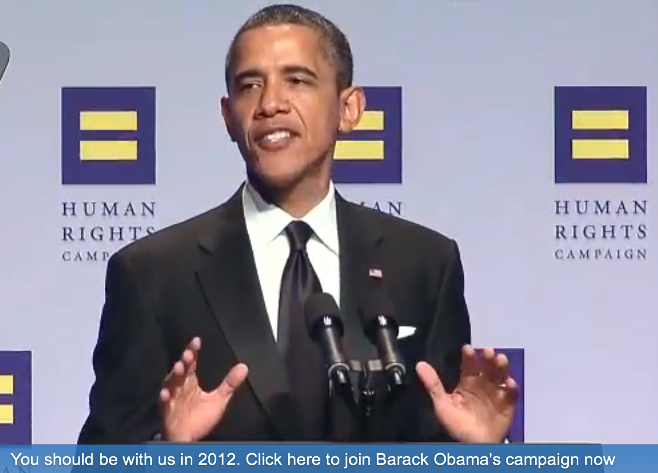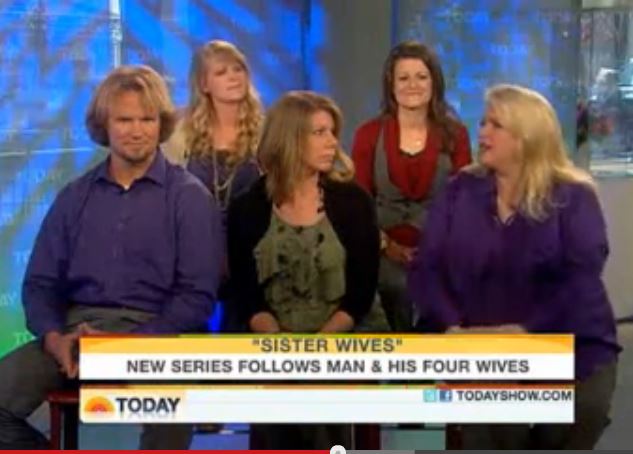gay marriage Tag
Supreme Court to decide whether Gay Marriage is constitutional right (Reader Poll – How will SCOTUS Rule?)
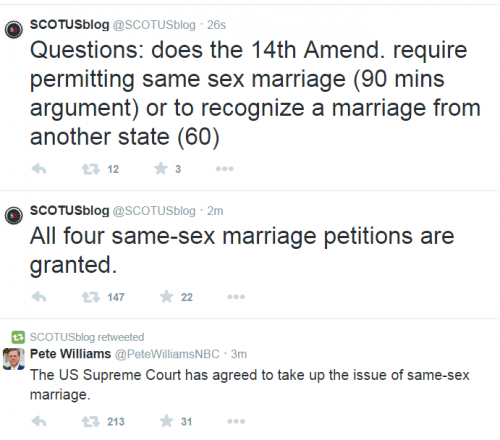 Here is the Court Order:
Here is the Court Order:
Sixth Circuit Appeals Court sides with states on Gay Marriage
At this point, the decision conflicts directly with federal appeals courts in the Fourth, Seventh, Ninth, and Tenth Circuits — precisely the kind of division of judgment that ordinarily will lead the Supreme Court to step in to resolve the split, especially on an issue of fundamental constitutional significance. So far, the Court has passed up review of any of the lower-court decisions striking down state bans that it has considered, and it has even refused recently to put lower-court decisions on hold until appeals could be filed and decided by the Justices. In widely reported public comments, Justice Ruth Bader Ginsburg has indicated that the main reason the Court had bypassed the cases up to this point was that there was no current split among the courts of appeals. Now there is a split, and it is a stark one. In one sweeping decision, the Sixth Circuit has given all of the states in its geographic region a victory for their bans on both initial marriages of same-sex couples and official recognition of such marriages performed outside of the couples’ home states. By contrast, other federal courts have nullified identical bans in thirteen states just over the past few months, with the prospect that the number would soon rise to sixteen — for a total of thirty-five states, plus Washington, D.C., allowing such marriages.
Supreme Court may have decided gay marriage issue by not deciding
The Supreme Court had issued the first round of orders from the September 29 Conference last Thursday, adding eleven new cases to its docket for the new Term. Many people had anticipated that one or more of the same-sex marriage petitions might be on that list, but the Court did not act on any of them at the time. Last month Justice Ruth Bader Ginsburg had suggested that the Court might not step into the controversy at this point, because there was no disagreement among the lower courts on that issue. Today her prediction proved true, with the Court denying review (without any comment) of the seven petitions: Bogan v. Baskin (Indiana); Walker v. Wolf (Wisconsin); Herbert v. Kitchen (Utah); McQuigg v. Bostic (Virginia); Rainey v. Bostic (Virginia); Schaefer v. Bostic(Virginia); and Smith v. Bishop (Oklahoma).The NY Times explains the impact:
Supreme Court set to consider taking gay marriage, other hot-button cases
The Supreme Court will not only be considering the matter of timing. What case or cases it ultimately hears will help determine the scope of its eventual ruling, both as it pertains to marriage itself – will its ruling apply to the ability of gay couples to get married in all states or just whether states have to recognize the same-sex marriages of other states – and the decision’s implications outside the issues of marriage. “The court is going to have to decide how much it is going to put on its plate,” said Gregory Garre, a former U.S. solicitor general and now the chairman of the Supreme Court and Appellate practice at Latham & Watkins, at a panel sponsored by the American Constitution Society for Law and Policy. Bans in Utah and Oklahoma, both overturned in separate decisions by the 10th Circuit, were decided on the basis of due process, meaning that denying gay couples the ability to wed deprives them of their fundamental right to marry. The 7th Circuit decision finding Indiana’s and Wisconsin’s same-sex marriage bans unconstitutional did so on the grounds of the equal protection clause of the 14th Amendment, with the unanimous panel arguing that same-sex marriage bans discriminate against one’s sexual orientation. If the Supreme Court decides on a case that invokes the equal protection clause, how it interprets the 14th Amendment could affect judicial rulings on other questions of LGBT rights and discrimination. Those on both sides of the argument say they can win on either grounds.
Chick-fil-A Founder’s Appreciation Day
Mr. Cathy, an entrepreneur from an early age, built Chick-fil-A from a small diner founded in an Atlanta suburb 68 years ago into the top fast-food chicken chain in the U.S. Known for its grounding in the tenets of the founder's religious devotion as well as for its fried-chicken sandwiches, the closely held company has expanded to more than 1,800 stores in 40 states. Its sales have grown for 47 straight years, to $5 billion last year, Chick-fil-A says.... After some early setbacks, Mr. Cathy invented the original Chick-fil-A sandwich in 1964, considered to be the first fast-food chicken sandwich, and opened the company's first restaurant in Atlanta in 1967, according to a timeline on the company's website. He expanded the company in part by setting his restaurants in suburban shopping malls. Throughout, Mr. Cathy emphasized Christian values. The chain's locations are closed on Sundays and play religious-themed music. Mr. Cathy founded a youth-ministry organization, WinShape Foundation, in 1984, which provides leadership training and college scholarships to young people. Through the foundation, 13 foster homes have been created to provide long-term care for foster children in a family setting.Chick-fil-A drew attention when activist groups and local politicians tried to force Chick-fil-A out of some cities because of its founding family's views on marriage and charitable donations. There never was an allegation of discrimination in the workplace -- this was pure political retribution, a precursor to purges such as that against Brendan Eich. We had extensive coverage of the anti-Chick-fil-A movement, including these posts:
- When political correctness runs amok, it will look like the Mayor of Boston
- Now Chicago Alderman seeks to ban Chick-fil-A
- Chicagoans hungry to flip the bird to Rahm, nicely
- NYC, NYU and Chick-fil-A — fast food with a side order of unconstitutional bullying
Federal Judge Upholds Louisiana Same Sex Marriage Ban
“It would no doubt be celebrated to be in the company of the near-unanimity of the many other federal courts that have spoken to this pressing issue, if this court were confident in the belief that those cases provide a correct guide,” Feldman wrote. “Clearly, many other courts will have an opportunity to take up the issue of same-sex marriage; courts of appeals and, at some point, the U.S. Supreme Court. The decision of this court is but one studied decision among many.”You can read the full opinion here. In his opinion, U.S. District Judge Martin Feldman makes the point that most legal scholars have been---until now---unwilling to make: that the Supreme Court has never held that sexual orientation constitutes a protected class. Because of this inconvenient technicality, proper brief writing challenging same sex marriage bans should focus on whether or not the ban came about as a result of some sort of animosity toward gay people. This, of course, was not sufficiently proven:
SCOTUS blocks same sex marriage in Virginia
While nearly all federal and state courts have ruled in favor of same-sex marriage since the high court issued two landmark decisions in June 2013, judges have blocked nearly all such marriages while the cases are appealed. The justices had stepped in once before, in Utah, to do just that. If the court declines to hear the Virginia appeal, the stay would be lifted and couples could begin getting married. Otherwise, those marriages would have to wait until the case is ultimately decided. "The Supreme Court is making clear, as it already did in the Utah marriage case, that it believes a dignified process is better than disorder," said Byron Babione, senior counsel at Alliance Defending Freedom, which represents the Virginia court clerk opposed to same-sex marriage.Virginia Attorney General Mike Herring, who has decided not to support the new ban, actually asked the Supreme Court to issue a stay on the Fourth Circuit's ruling, citing concerns over the impact an eventual negative ruling could have on families and businesses.
IRS Admits Leaking Personal Information In Prop 8 Debate
Two years after activists for same-sex marriage obtained the confidential tax return and donor list of a national group opposed to redefining marriage, the Internal Revenue Service has admitted wrongdoing and agreed to settle the resulting lawsuit. The Daily Signal has learned that, under a consent judgment today, the IRS agreed to pay $50,000 in damages to the National Organization for Marriage as a result of the unlawful release of the confidential information to a gay rights group, the Human Rights Campaign, that is NOM’s chief political rival. “Congress made the disclosure of confidential tax return information a serious matter for a reason,” NOM Chairman John D. Eastman told The Daily Signal. “We’re delighted that the IRS has now been held accountable for the illegal disclosure of our list of major donors from our tax return.”This admission by the IRS goes back to the vicious fight over the Prop 8 vote in California where HRC and its allies resorted to releasing donation information of individuals and harassing those traditional marriage supporters at their homes and businesses.
The worst line in Hillary’s blackboard-scratchingly bad NPR interview
The thin-skinned, evasive, contrived Hillary on full display....
Delawyering traditional marriage supporters
As U.S. lawsuits seeking gay-marriage rights move toward a likely showdown at the Supreme Court next year, major law firms are rushing to get involved — but only on the side of the proponents. A Reuters review of more than 100 court filings during the past year shows that at least 30 of the country's largest firms are representing challengers to state laws banning same-sex marriage. Not a single member of the Am Law 200, a commonly used ranking of the largest U.S. firms by revenue, is defending gay marriage prohibitions. These numbers and interviews with lawyers on both sides suggest that the legal industry has reached its Mozilla moment. The software company's CEO, Brendan Eich, resigned in April after being denounced by gay marriage supporters for a donation he had made in support of California's since-overturned gay marriage ban. Now in a similar vein, attorneys at major law firms are getting the message that if they want to litigate against gay marriage they should do so elsewhere.None of this will come as a surprise to Legal Insurrection readers. We wrote in April 2011, how the large law firm of King & Spalding withdrew its representation of the House of Representatives on the DOMA litigation after the Human Rights Campaign started contacting King & Spalding clients unrelated to the litigation, and threats were made to hold protests at clients' offices. King & Spalding did not, however, simultaneously drop its representation of radical Islamic Gitmo detainees who promote societies that treat women and gays as subhuman. I wrote at the time that there was A Hostile Environment For Pro-Traditional Marriage Views At King & Spalding, such that the expression of any contrary view was a potential career ender. We now know how true that can be, as the Brendan Eich case demonstrated.
“The pomposity and arrogance of these children (of the corn?) is just amazing”
Through the activist group Virginia Student Power Network, GetEQUAL found two UVA students willing to take up the cause of calling out Laycock: rising fourth-year Greg Lewis and now-alum Stephanie Montenegro. Last week, the pair sent an open letter to Laycock asking him to consider the “real-world consequences that [his] work is having.” They also submitted a Freedom of Information Act request seeking e-mails between Laycock and various right-wing and religious liberty groups. Lewis said they’re not trying to smear Laycock, and they’re not trying to undermine academic freedom. They just want a dialogue, he said.Bullshit. You don't start a dialogue with FOIA requests. This is a blatant effort at deterring public participation by anyone who does not hew 100% to the most radical version of the gay rights movement.
So, was evisceration of Brendan Eich “a PR stunt … nothing but a PR stunt”?
If people were played here, when does the boycott of OKCupid start?...
Mozilla blowback: bursting the PC bubble?
I checked the records for some of the largest technology companies in Silicon Valley: specifically those that were in the Fortune 500 as of 2008. The list includes Hewlett-Packard, Intel, Cisco Systems, Apple, Google, Sun Microsystems, eBay, Oracle, Yahoo, Advanced Micro Devices (AMD) and Symantec. I limited the search to donors who listed California as their location. In total between these 11 companies, 83 percent of employee donations were in opposition to Proposition 8. So Eich was in a 17 percent minority relative to the top companies in Silicon Valley... At Intel, 60 percent of employee donations were in support of Proposition 8. By contrast, at Apple, 94 percent of employee donations were made in opposition to Proposition 8. The opposition was even higher at Google, where 96 percent of employee donations were against it, including $100,000 from co-founder Sergey Brin.
Before Brendan Eich, they came for the Mormons
The template was drawn in November 2008, and unleashed when Obama evolved....
Utah federal judge strikes down key part of anti-polygamy law
No polygamous marriages yet, but polygamous family relationships no longer illegal in Utah....
When do polygamists get to come out of the shadows?
Bringing people "out of the shadows" is the newest greatest. So what about polygamists? We've addressed this issue before, in a call for intellectual honesty: Polygamy – another love that now dares speak its name again “Polygamy would have to be permitted” Polyamory – at least be honest about it On...
Polygamy – another love that now dares speak its name again
Not that there's anything wrong with it (?)....
Donations tax deductible
to the full extent allowed by law.
CONTRIBUTORS
- William A. Jacobson
Founder
- Kemberlee Kaye
Sr. Contrib Editor
- Mary Chastain
Contrib Editor
- Fuzzy Slippers
Weekend Editor
- Mike LaChance
Higher Ed
- Leslie Eastman
Author
- Vijeta Uniyal
Author
- Stacey Matthews
Author
- Jane Coleman
Author
- James Nault
Author
- Mandy Nagy
Editor Emerita
- Learn more about the Contributors


